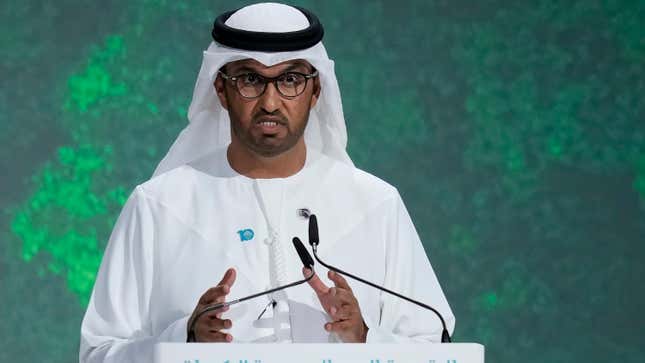
The world’s most important climate meeting this year is going to be headed up by one of the world’s most oil-reliant countries. It sounds like the plot of an absurdist play, but it’s reality, and the cracks are already starting to show ahead of an especially crucial year for climate action.
Each year, the UN hosts what’s known as a Conference of Parties, or COP, in a different country to keep the world on track in working toward halting runaway climate change. This year’s meeting will be in the United Arab Emirates, just the second time a major petrochemical nation has hosted a COP, according to Bloomberg. The last time was in 2012, in Qatar, three years before the Paris Agreement. This year, experts have warned that we are on an extremely tight schedule in terms of avoiding the worst impacts of climate change. It’s a make-or-break year—and the world is handing the keys to the metaphorical car over to, essentially, the head of an oil company.
Sultan Ahmed Al Jaber, the UAE’s minister of industry and advanced technology and the CEO of Abu Dhabi National Oil Company (Adnoc), in January became the first oil CEO to take up the COP presidency. Despite Al Jaber’s long list of green credentials—he also heads up a government-owned renewables company—it’s still an undeniably weird position for an oil CEO to be in, to say the absolute least.
In a long Bloomberg profile of Al Jaber, who has given few interviews since assuming the COP presidency, published this week, this weirdness comes through. The piece focuses on his past “enthusiasm for renewables” and how he seems determined to prove that an oil-producing country can lead the way on climate action; during Al Jaber’s pre-COP media tour, he has insisted that the 1.5-degree target is “non-negotiable.”
Yet there’s no denying that Al Jaber is heading up one of the world’s biggest polluters and that his company has no plans to stop producing fossil fuels anytime soon. In terms of historic emissions, Bloomberg reports, Adnoc emits more than 150 million more tons of CO2 each year than ExxonMobil. The company is also moving full-steam ahead with its plans to increase oil production, despite every climate analysis showing that we need to stop new oil production as quickly as possible. Data released by the Guardian this week shows that 90% of the oil Adnoc is planning to extract over the next few years needs to stay in the ground in order to meet net-zero scenarios set out by the world’s major energy agency.
The UAE itself gets 30% of its GDP from oil and is incredibly reliant on continued fossil fuel production, which influences its politics on the global stage. As Bloomberg explained, the UAE and its petrostate allies in the region may actually be partly responsible for the snail’s pace of climate action that we’ve seen over the past few decades at UN climate meetings. Twenty years ago, Saudi Arabia, one of the UAE’s closest allies and another oil giant, blocked the adoption of a set of rules of procedure that would have allowed for issues to be decided with a majority vote; as a result, all countries have to be in consensus in decisions made at COPs, enabling a vocal minority to keep real progress from being made. In recent years, representatives from countries majorly dependent on oil have used this gridlock to their advantage—including in 2021 in Glasgow, when Saudi Arabia teamed up with other major fossil fuel-based economies to kill a line of text that would have committed the world to phasing out dirty energy.
So it’s understandable that people are suspicious of an oil- and gas-led climate conference, no matter how shiny Al Jaber’s green credentials are or the presence of the UAE’s own net-zero target. And there are growing signs that the UAE isn’t going to sit quietly with this kind of criticism. This week, the Financial Times reported that panelists at a climate and health conference held in the UAE last month were told not to “criticize corporations” or the UAE government.
“We understand that climate change can be a controversial subject and we welcome all perspectives and opinions in civil discourse throughout the programme agenda,” written guidance for the event, as reported by the FT, said. “Protesting is illegal in the United Arab Emirates and any instances of disruptive protesting will be handled by the local authorities.”
Corporate presence and influence at COPs is nothing new, and last year’s host country Egypt garnered international criticism for arresting protesters ahead of the climate meeting (protesting was ultimately allowed for the talks). But the UAE’s authoritarianism, combined with its commitment to continued oil production, is contributing to an atmosphere unlike any a COP has ever seen—during a crucial year for global climate action.

